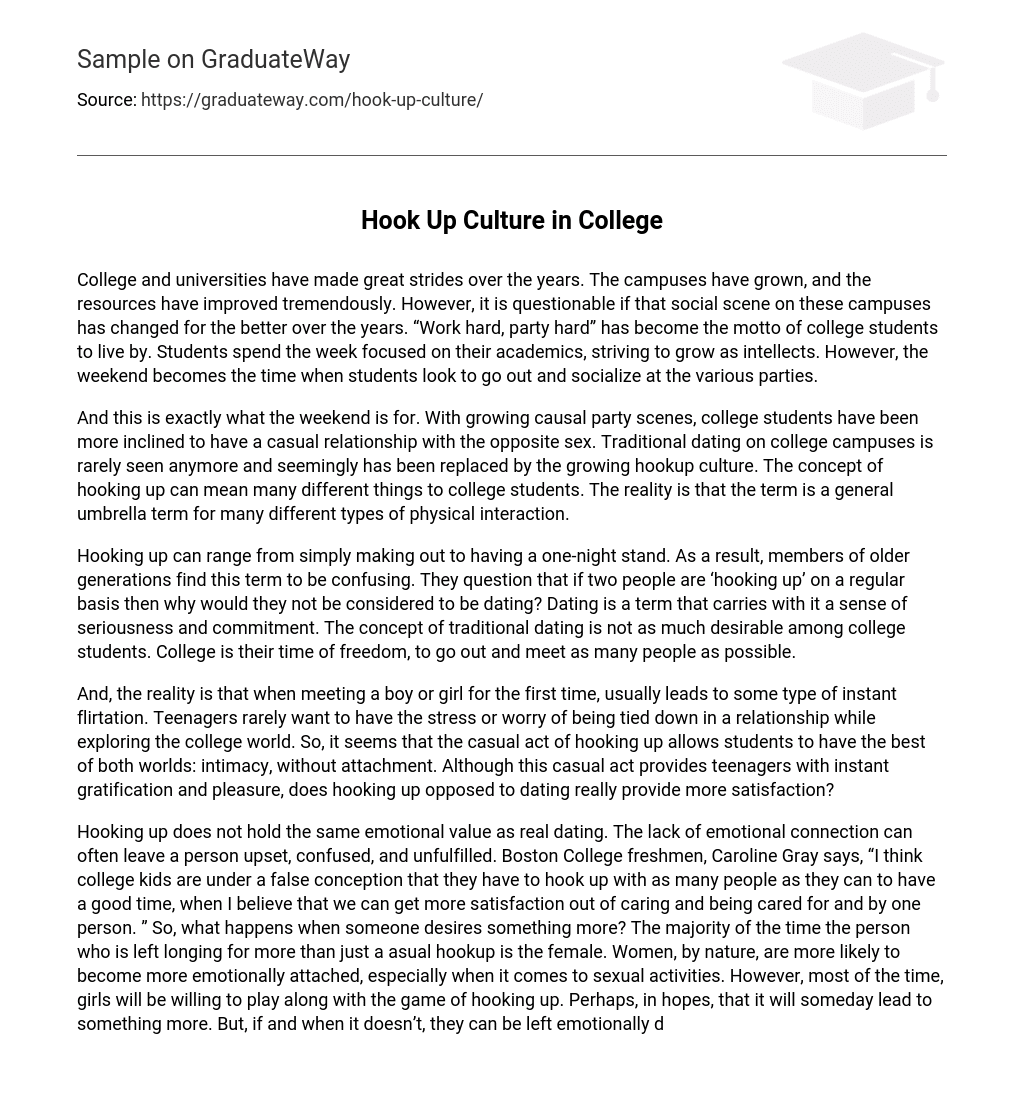Despite the progress made in campus expansion and resource enhancement, there is still uncertainty about improving the social scene in colleges and universities. The prevailing motto among students has become “Work hard, party hard.” Weekdays are focused on academics as students strive to broaden their intellectual horizons. However, weekends are solely dedicated to socializing and attending parties.
Among the younger generation, college students are increasingly favoring casual relationships with the opposite sex on weekends instead of traditional dating on campuses. This shift has resulted in the emergence of a hookup culture, where individuals have varying understandings of engaging in physical interactions.
Hooking up includes a variety of actions, ranging from kissing to participating in casual sexual encounters. Older generations may find it confusing why individuals engaging in these activities are not considered to be dating on a regular basis. Traditional dating is often linked with commitment and seriousness, which college students do not find appealing. During their time in college, they prioritize their freedom and strive to meet numerous individuals.
When teenagers first meet someone, it is typical for them to engage in immediate flirtation. Teens prefer not to be committed to a relationship while they explore the college world. As a result, hooking up seems to provide the advantages of intimacy without attachment. However, does hooking up genuinely offer more satisfaction compared to dating? While it may provide instant gratification and pleasure, this casual act may not necessarily offer greater satisfaction.
Hooking up is not as emotionally fulfilling as traditional dating, leaving individuals feeling upset, confused, and unsatisfied. According to Boston College freshman Caroline Gray, there is a misconception among college students that hooking up with multiple people is necessary for a good time. However, she believes that finding care and reciprocating it with one person can bring greater satisfaction. Nonetheless, when someone desires more than a casual encounter, it is typically women who are left yearning. Women tend to develop stronger emotional attachments, especially in sexual situations. Despite this fact, some women may still engage in hookups hoping for a deeper connection in the future. When this expectation goes unfulfilled, they experience emotional distress. In contrast, boys are less selective when choosing partners.
In a study that explored mate selection criteria for different levels of involvement, it was discovered that men should demonstrate the same level of selectiveness as women when seeking long-term partners. However, they should exhibit less selectiveness than women when searching for short-term partners (Kenrick). Unlike girls, boys are less inclined to consider all aspects of a girl when planning to engage in casual relationships. This is because their primary focus is on short-term stimulation and they are not as discerning. Hooking up entails casual encounters that carry various risks, particularly for females, such as emotional and physical hazards like potential pregnancy.
Despite their fear of being alone, these girls are open to participating in casual sexual encounters. Due to the scarcity of relationship and dating opportunities, random hookups without commitments become the most accessible choice, and sometimes the only option available. Occasionally, individuals may engage in such encounters with hopes of persuading the other person to reconsider their desire for a serious romantic partnership.
The majority of girls desire a genuine connection with someone who truly wants to be with them and whom they could potentially develop romantic feelings for. They participate in the hookup culture hoping that these casual encounters will eventually turn into something more meaningful. As a result, this culture continues to thrive despite not being an ideal situation for most females. However, parents of college students are eager to understand why dating is no longer common among their children. One contributing factor is the effort required in dating, which involves making plans and coordinating schedules.
Unlike the parents of our generation, dating on college campuses often begins with casual hooking up and talking, gradually becoming more serious. However, students are less inclined to spend time and effort on someone they hardly know, uncertain of the outcome. They question whether a expensive dinner is worthwhile and if they cannot answer affirmatively, they are unlikely to pursue that option. Instead, they seek easier alternatives that typically involve cheap beer, flirting, and casual hookups.
Despite the decline of traditional dating, the hookup culture is gaining popularity among college students. Many lack the time or desire for commitment and instead opt for casual sexual encounters. This allows them to satisfy their attractions without entering a more serious relationship. The college dating scene, which once offered a compromise between commitment and casual affairs, seems to be fading away. Although I acknowledge the prevalence of the hookup culture, there are no indications that it will decrease anytime soon.





